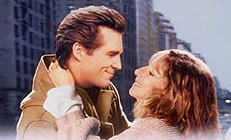|
|
|
|
The
Mirror Has Two Faces
|
 |
|
The Mirror Has Two Faces is an embarrassment. This is not a casual judgment: I am a fan of Barbra Streisand as a performer and especially as a director – Yentl (1983) and The Prince of Tide (1991) are sentimental favourites of mine. But there is a scarcely a likable element to redeem this ghastly film. It is Streisand's first attempt at making a romantic comedy, after the heightened, angst-ridden melodrama of her previous films. How can the actor who was once so funny on screen in the '60s and '70s turn out to be such a hopeless director of comedy? The writing is on the wall from an early, clumsy scene in which maths teacher Gregory (Jeff Bridges) falls to pieces at the lecture podium when his old flame Candy (Elle Macpherson) starts crossing her legs in the audience. Although Gregory is a passionate, highly sexed guy, the film asks us to accept that hard luck in love turns him fanatically celibate. Even less plausibly, we are then presented with a Platonic marital arrangement between Gregory and the equally passionate literature professor Rose (Streisand). In a famous essay, the American critic Brian Henderson argued that romantic comedy is an impossible genre to successfully revive today, because the taboo that kept the central lovers from instantly having sex with each other is long gone. This film tries to reinstate the taboo, with all the erotic tension and frustrated laughter that it can spark – and fails miserably. Everything in Richard LaGravenese's script and Streisand's direction is ill-judged. The endless face-off between Gregory's scientific rationality and Rose's romantic idealism becomes pat and tiresome. The film's attempt to critique the beauty myth in women's lives goes right out the door when Rose is given the most extravagant make-over in cinema history. And, to cap it off, it's a story in which all the guys – Gregory included – are insufferable dorks. Only the presence of Lauren Bacall as Rose's mother offers a bracing dose of 'woman's film' pathos. That, and two precious shots of Barbra – crumpled in anguish on the floor after having been sexually rejected (the movie's sole dramatic moment), and posing ecstatically in front of a mirror as if about to burst into song. Come to think of it, maybe The Mirror Has Two Faces could have worked as a musical. Postscript 2002: Although I still think it's pretty awful, The Mirror Has Two Faces has become a film I have watched many times for amusement, and has risen to the level of a camp classic in my eyes. Especially priceless is the scene of Streisand's grandly theatrical lecture on love and sex to a packed classroom. I shall also forevermore associate this film with the rebuking letter I received from its Australian distributor after the above review was initially published, disallowing my opinion because I was not a member of its target audience: middle-aged women! © Adrian Martin January 1997 |
![]()